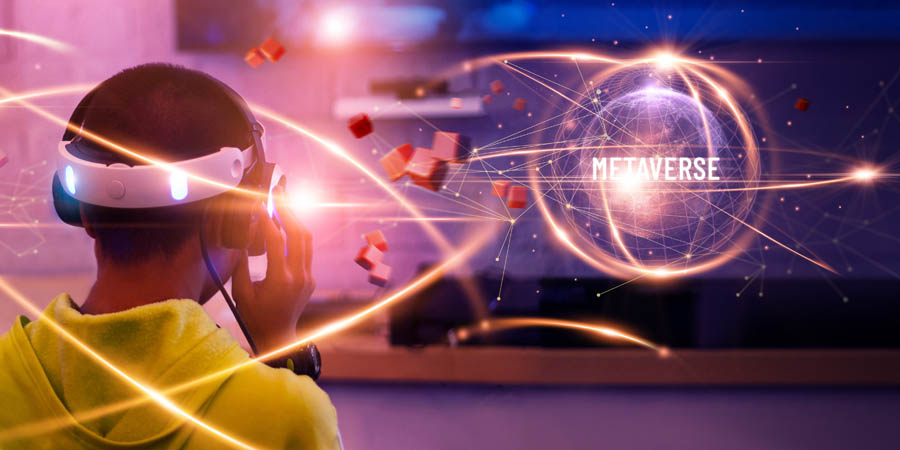In an era where excess screen time and social media are often associated with declining psychological well-being, the concept of the metaverse emerges as a potential remedy for the growing mental health crisis, spanning continents from Africa to other parts of the world. While digital interactions can contribute to mental health issues, responsible use of shared virtual spaces within the metaverse offers a unique opportunity to address and combat these challenges.
Virtual shared spaces, commonly referred to as the metaverse, represent digital environments where individuals can interact both professionally and socially. Enriched with augmented or virtual reality (AR/VR), these spaces hold promise as a solution to the escalating mental health crisis that predates the COVID-19 pandemic. This holds not only in regions more commonly associated with technological advancements but also in diverse locations, including the dynamic landscape of Africa.
Addressing the Mental Health Crisis
The current mental health crisis has reached unprecedented levels, exacerbated by a shortage of mental health providers. Efforts are underway, particularly in the United States, to introduce federal reimbursement opportunities for tele-mental health services to bridge this gap.
Moreover, adolescents, facing physical and social changes, are vulnerable to mental health issues due to factors like poverty or abuse. Globally, 1 in 7 adolescents experience mental health conditions, often unnoticed. These conditions lead to social exclusion, stigma, educational challenges, risky behaviors, and human rights violations. Safeguarding their well-being is important for a healthier transition into adulthood.
The metaverse, with its potential for mental health-centered technology, could provide comprehensive support across various aspects of mental health, including prevention, diagnostics, therapy, education, and research.
Main Risks and Benefits of Metaverse on Mental Health
The Metaverse signifies the next stage in the Internet's evolution – an extensive network of interconnected virtual realms where daily activities, from work and shopping to attending classes or socializing, can unfold. Applications like Meta Horizon Worlds, VRChat, and Rec Room are already creating environments for user communities to engage in various activities within immersive digital spaces.
While the Metaverse holds vast potential in education, telecommuting, and entertainment, concerns are emerging regarding its social and ethical implications, especially its potential impact on mental health.
Scientific studies exploring these concerns are in their early stages, examining mental health beyond clinical disorders and considering subjective well-being. Understanding both risks and potential benefits for users' mental health is important.
Potential Mental Health Risks in the Metaverse:
- Harassment: Immersive virtual worlds in the Metaverse, experienced through virtual reality goggles, create a strong sense of presence. However, this illusion amplifies negative effects, especially in instances of online harassment. Studies reveal that aggression towards avatars can have a psychological impact similar to that of physical aggression towards the real body. Establishing preventive mechanisms is essential to address this issue.
- Addiction: The potential for addiction to virtual reality applications, such as games or social platforms, is a concern. The heightened sense of presence in immersive experiences may increase the psychological reward and addictive potential. Research indicates that while the prevalence of addictive behaviors among Metaverse users is comparable to other technologies, there's a connection between the feeling of embodiment (avatar as one's real body) and addiction symptoms. This suggests that users experiencing a stronger sense of embodiment may be at a higher risk of developing addictive behaviors.
Advantages of the Metaverse for Mental Health:
- Enhanced Virtual Interactions: While the sense of presence in virtual applications may intensify certain negative aspects, it also fosters positive interactions crucial for users' well-being. Building a fulfilling social life with rich, meaningful relationships is integral to psychological well-being. Previous studies have highlighted the positive impact of technologies like social networks and online video games in facilitating easier connections with distant loved ones, expanding social capital, and connecting with individuals sharing similar circumstances or interests.
- Physical Presence Illusion in Virtual Worlds: Immersive applications, supported by recent evidence, indicate that the feeling of presence enhances these benefits. When interacting through avatars in a virtual space, users experience the illusion of genuinely sharing the same space and can perform actions similar to those in physical reality, such as making eye contact or giving a virtual hug.
- Heightened Interpersonal Connection: Studies, including interviews and user surveys, suggest that these 'realistic' interactions stimulate feelings of connection more strongly than less immersive media like video calling or text messaging. For instance, during the COVID-19 pandemic, students in a VR-generated class reported a greater sense of connection and community, which contributed to their well-being. Engaging in activities like meeting people with similar profiles, practicing social skills, or learning languages in the virtual world further enhances users' sense of being there with others, positively impacting their mental health.
As we delve into the intricate relationship between the Metaverse and mental health, ongoing studies mark just the starting point. Research underscores crucial principles for meaningful inquiry. It emphasizes the need to focus on specific use cases within the Metaverse, consider individual user characteristics, understand the temporal aspects of effects, evaluate the size and practical relevance of observed impacts, and discern the direction and causality of relationships.
Achieving a nuanced understanding of the potential impact on our mental health requires sophisticated research that goes beyond simplistic questions, representing the initial steps in unraveling the complexities of this technological revolution and its implications for our lives in the years ahead.








